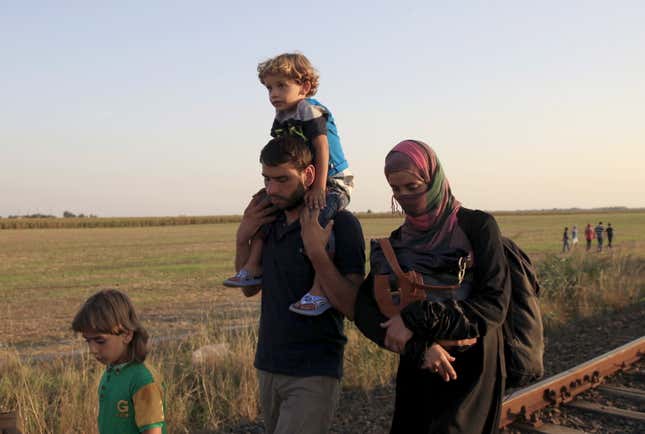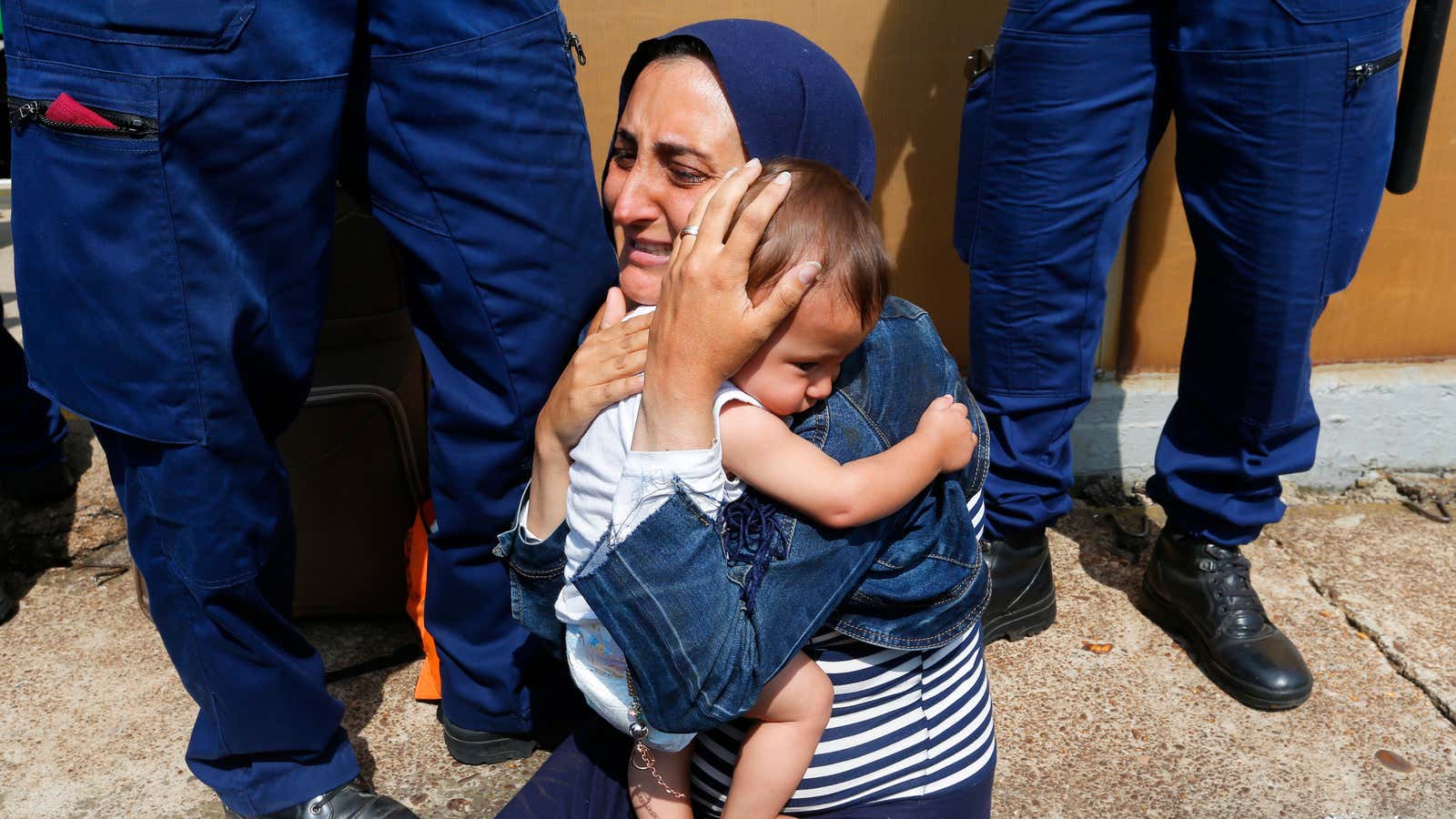“Xenophobic and anti-Muslim” was how the UN High Commissioner for Human Rights described Hungary’s treatment of Syrian and other refugees, desperate for safe harbor. Yet Hungary appears unmoved by the fierce international criticism. Prime minister Viktor Orbán has insisted his country doesn’t want Muslims, and a sentiment echoed by members of his party. “We want to decide ourselves how many Muslims we want to live with,” a parliamentarian for the nationalist-conservative Fidesz party declared.
Other Eastern European countries are making similar, if less obviously callous, arguments. Leaders of Poland, the Czech Republic, and now Slovenia are hesitant to accept Muslim refugees. Slovakia offered to accept a token 200 refugees, on the condition that they be Christians. As Slovak interior-ministry spokesman Ivan Netik put it, his country lacks mosques, and therefore Muslims would not feel at home.
In all these pronouncements, Islam is represented as foreign to Europe. Even when politicians do talk positively about Islam in Europe, they tend to stick to the large Muslim populations in the United Kingdom, France, or Germany, most of whom arrived relatively recently. If Islam isn’t foreign to Europe, the narrative goes, then it’s new—something it’ll take Europeans (at least those who are practicing Christians) time to get used to.
But this is false. Not just because Europe is an idea, and not a physical reality. Not just because nationalisms are imagined, constructed, and selectively edited. Not just because Islam, like Christianity and Judaism, is a Near Eastern religion.
The truth is that Muslims have lived in Europe for centuries. And while Germany and France have the largest Muslim populations of any nation in Europe (unless we’re counting Russia or Turkey), the European Union member with the highest percentage of Muslims is actually Bulgaria.
These are not immigrants.
Some are descendants of Turks who’ve lived in what is now Bulgaria for centuries. But many of them are Bulgarians who converted to Islam under Ottoman rule. By choice.
How old is European Islam?
When Viktor Orbán isn’t busy rigging the system in favor of his increasingly authoritarian party, otherwise destroying Hungarian democracy, passively observing a dangerous rise in anti-Semitism, or cozying up to Vladimir Putin (best friend to Islamophobes like the Assad regime, which is driving so many Syrians to Hungary in the first place), he’s rewriting history.
It’s a long history, even without the longer legacy of Spanish, Portuguese, and Sicilian Islam. But briefly:
The Ottoman Empire invaded and conquered the Balkans in the 14th century. Many of their new subjects slowly began to convert to Islam. That might sound shocking, and some use this as proof Islam isn’t indigenous to Europe. But such xenophobic logic ignores the fact that Christianity spread through Europe in almost the same way; in fact, while the Ottomans were establishing themselves in Eastern Europe, Teutonic knights were already crusading against the indigenous peoples of what are now the Baltic states, forcing them to convert to Christianity. But who amongst us thinks Lithuania or Latvia is any less European for it? Islam is simply held to a different standard.
Rising nationalism saw many of these early Muslim communities wiped out, not very differently from how Eastern Europe’s Jewish communities were. The decline of Ottoman power in the 19th century was like a receding tide, leaving behind isolated communities, often viciously attacked by authoritarian, homogeneity-obsessed nationalists.
Decades of massacres and expulsions have reduced Eastern European Islam to pockets within pockets in Albania, Kosovo, Bosnia, Macedonia, Montenegro, Bulgaria. It’s tragic, but it’s not exceptional. At the same time that many Muslims were being wiped out in Europe, Ottoman armies were extinguishing the Christian Armenian population of Anatolia.
Not all swords and sultans

But Islam in Europe isn’t just about armies invading, establishing rule and imposing their religion. (Even though that’s pretty much how most of history worked elsewhere too.) In some places, Muslims thrived as minorities, including in Hungary.
If you take a look at European language families, you’ll see something curious. Hungarian doesn’t belong. Its closest European linguistic relatives are Finnish and Estonian, and its next of kin can actually be traced to the Ural Mountains, outside of Europe.
Indeed the Hungarians—how’s this for irony?—are believed to have originated in Central Asia, arriving in Europe as non-Christian invaders. There is evidence, in fact, of Muslims living among these tribes (paywall), meaning that Hungarian Islam could predate Hungarian Christianity. Are you listening, Viktor?
For a long time, until crusading zeal persuaded them otherwise (very much like the modern Muslim world), Hungary’s kings accepted the Muslims among them, as did the Polish-Lithuanian Commonwealth next door, one of the most remarkable and overlooked states in history. Interfaith cooperation was strong enough that in 1683, when the Ottoman Empire laid siege to Austrian Vienna, Polish Muslims mustered their horsemen and helped their Christian countrymen and allies break the siege.
In his terrorist manifesto, Anders Breivik singles out the Battle of Vienna in 1683 as a turning point in the war between Christians and Muslims. But Breivik, too was mistaken. The Battle of Vienna was in fact a struggle between Muslims allied with some Christians to defeat a neighboring Muslim power allied with some other Christians. As for the Polish Muslims? They survived for a very long time. Some of their descendants even fought the Nazis on behalf of Poland. Today, small villages of Polish Muslims remain, the last remnants of a brilliant heritage that even included Belarusian and Polish literary culture.
To refuse refugees on the grounds of their religion is to partake in a myth that is inaccurate, prejudicial, and dangerous. European Muslims were neither exclusively saints nor wholly sinners. But they were Europeans. Some Hungarians have gone out of their way to offer aid and assistance, but Viktor Orbán represents his country to the world. Perhaps he should show a little charity to people forced out of their homes. On this Viktor Orbán and I should agree: biblically (and Quranically) speaking, we’re all descended from Adam and Eve, who were expelled from heaven, and had to look for somewhere else to live.
